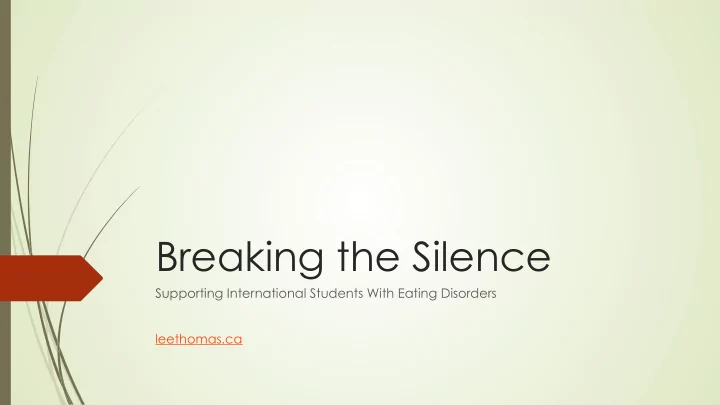

Breaking the Silence Supporting International Students With Eating Disorders leethomas.ca
WELCOME! � Who I am � Placing me � My ‘expertise’ � My real expertise
What we’re going to talk about today � What are eating disorders � Types of eating disorders � Signs and symptoms � Having difficult conversations � The specific international student context
“Ground rules” � Questions are encouraged! � Feedback — always looking to learn new things and improve! � Triggers - not expected, but take care of yourself � Relax, learn, have fun!
Introductions: Who are YOU?
Let’s get started!
Where do we learn about eating habits, body image, etc?
Where do we learn about eating habits, body image, etc? Family Culture Media Personal experiences
Eating disorders vs. Disordered eating
Where is the line between ED and disordered eating? � A lot of it is in the “why” � How do we learn the “why”?
(Some) Types of Eating Disorders � Anorexia � Bulimia � Binge Eating Disorder � EDNOS/OSFED � Others: Pica, Orthorexia, night eating syndrome, compulsive exercising, etc.
Emotional/behavioural signs & symptoms Preoccupation with weight, food, calories, macronutrients, etc. Refusal to eat certain foods, progressing to restrictions against whole categories of food (e.g., no carbohydrates, etc.) Appears uncomfortable eating around others Food rituals (e.g. eats only a particular food or food group, excessive chewing, doesn’t allow foods to touch)
Emotional/behavioural signs & symptoms Skipping meals or taking small portions of food at regular meals Any new practices with food or fad diets, including cutting out entire food groups (no sugar, no carbs, no dairy, vegetarianism/veganism) Withdrawal from usual friends and activities Extreme concern with body size and shape Frequent checking in the mirror for perceived flaws in appearance Extreme mood swings
Physical Signs & Symptoms of EDs Noticeable fluctuations in weight, both up and down Stomach cramps, other non-specific gastrointestinal complaints (constipation, acid reflux, etc.) Menstrual irregularities Difficulties concentrating Abnormal laboratory findings (anemia, low thyroid and hormone levels, low potassium, low white and red blood cell counts) Dizziness or fainting Feeling cold all the time
Physical Signs & Symptoms of EDs Sleep problems Cuts and calluses across the top of finger joints (a result of inducing vomiting) Dental problems, such as enamel erosion, cavities, and tooth sensitivity Dry skin and hair, and brittle nails Fine hair on body (lanugo) Muscle weakness Cold, mottled hands and feet or swelling of feet Poor wound healing/ impaired immune functioning
Common misconceptions abut eating disorders � You can tell if someone has an eating disorder by looking at them � Eating disorders are just a phase that teenagers will grow out of � Eating disorders are not serious, they are just a lifestyle choice
Common misconceptions about eating disorders � Families are to blame for eating disorders � Dieting is a normal and necessary part of life � Eating disorders are a recent problem caused by images in the media
Common misconceptions abut eating disorders � Eating disorders are only about food � Only women can get eating disorders � If my loved one had an eating disorder, they would tell me
Common misconceptions abut eating disorders � Eating disorders are only life-threatening if you are very thin � Recovery from eating disorders is rare/impossible � Eating disorders are all about vanity/body image
Diet Culture and Disordered Eating � Differences in diet culture across � Over time � Social � Economic � Cultural � Professional (eg athletes) � Personal � “Healthy lifestyles” that are diet culture in disguise
What you can do if you are worried about a student (or friend or loved one) � Engage the person in a serious conversation at an appropriate time � Ask directly about ED/disordered eating thoughts or behaviours � Take them seriously & listen non-judgementally � Give reassurance, information, and encouragement � Manage your own emotions & expectations & educate yourself
What ‘causes’ Eating Disorders? � Well…. � Coping mechanism � Biology � Social context � Basically a whole whack of stuff.
Other things to think about � Eating disorders are sometimes concurrent/comorbid with anxiety disorders, depression/mood disorders, OCD, PTSD, etc. � While the media/society might not “cause” eating disorders, it is possible that they do contribute to disordered eating attitudes (eg promoting cleanses, diets, “get your pre-baby body back!”, etc.) � If you don’t have these conversations, it’s possible nobody will
The specific international student context � International students exist in a unique context: � Stigma “box” � Culture changes � Body changes � Food and lifestyle changes � Economic � Social � Leaving home family � …..STRESS!
Just some random practical tips if I haven’t mentioned them yet � Cite the behaviour, not the diagnosis (know your role) � Empathetic listening � ASK - TELL - ASK � Normalize, Validate, Give Hope � Setting realistic expectations of yourself and the student
THANK YOU! � Lee Thomas � leethomas.ca � facebook.com/leethomasspeaks � 780 706 9536
Recommend
More recommend